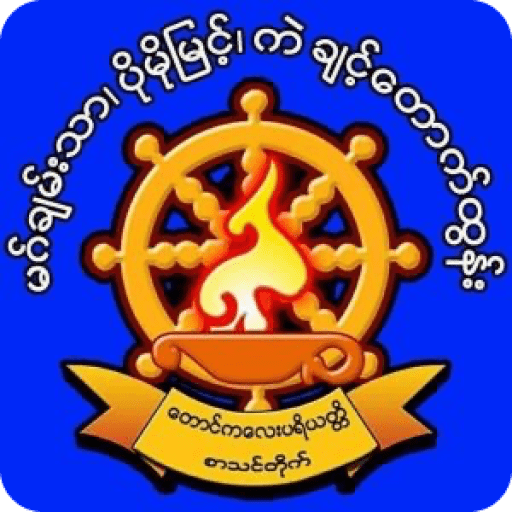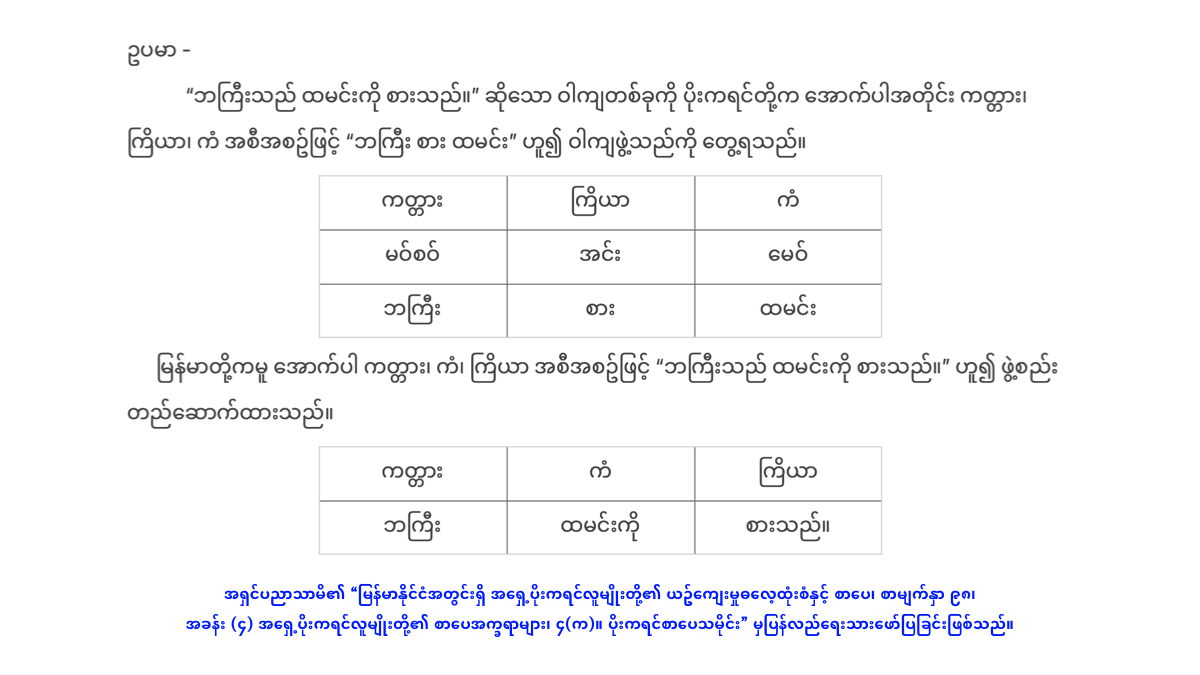As explained in the book, Culture, Customs and Literature of the Eastern Pwo Karen People in Myanmar, by Ashin Pin Nya Tha Mi (2022), the basic word order for Eastern Pwo Karen is Subject-Verb-Object, whereas the basic word order for Burmese is Subject-Object-Verb. We can see the examples shown below.
‘Uncle eats rice.’
| Subject (ကတ္တား) | Verb (ကြိယာ) | Object (ကံ) |
|---|---|---|
| မင်စဝ် | အင်း | မေဝ် |
| Uncle | eat | rice |
‘ဘကြီးသည် ထမင်းကို စားသည်။’
| ကတ္တား | ကြိယာ | ကံ |
|---|---|---|
| မင်စဝ် | အင်း | မေဝ် |
| ဘကြီး | စားသည် | ထမင်း |
According to the research from Kato (2019), Karenic languages follow the word order of Subject-Verb-Object, unlike the languages of the Tibeto-Burman language family, most of which are Subject-Object-Verb type.
Kato (2019) also cited that the change of Karenic languages from Object-Verb to Verb-Object could have been the result of contact with Mon in the late first millennium AD (700-999 AD).
Examples are shown below.
‘Thawa struck Thakhlein.’
| Subject (ကတ္တား) | Verb (ကြိယာ) | Object (ကံ) |
|---|---|---|
| သာအွာ | ဍောဟ် | သာခၠိင်း |
| Thawa | strike | Thakhlein |
“သာအွာသည် သာခလိင်းကို ရိုက်သည်။”
| ကတ္တား | ကြိယာ | ကံ |
|---|---|---|
| သာအွာ | ဍောဟ် | သာခၠိင်း |
| သာအွာ | ရိုက်သည် | သာခလိင်း |
In the case of a ditransitive verb, the two objects are arranged in the order of Recipient – Theme.
(Kato, 2019, p. 142)
‘Thawa gave Thakhlein a jackfruit.’
| Subject | Verb | Indirect Object | Direct Object |
|---|---|---|---|
| သာအွာ | ဖှ်ေလင့် | သာခၠိင်း | နွဲာသး။ |
| Thawa | give | Thakhlein | jackfruit |
“သာအွာသည် သာခလိုင်းကို ပိန္နဲသီးတစ်လုံး ပေးသည်။”
| ကတ္တား | ကြိယာ | ကံ (Indirect) | ကံ (Direct) |
|---|---|---|---|
| Subject | Verb | Indirect Object | Direct Object |
| သာအွာ | ဖှ်ေလင့် | သာခၠိင်း | နွဲာသး။ |
| သာအွာ | ပေးသည် | သာခလိင်း | ပိန္နဲသီး |
References:
Kato, A. (2019, June 3). Pwo Karen. The Mainland Southeast Asia Linguistic Area, 131–175. https://doi.org/10.1515/9783110401981-004
Pin Nya Tha Mi. (2022). Culture, Customs and Literature of the Eastern Pwo Karen People in Myanmar (1st Edition). Sarpay Beikman.
![]()

